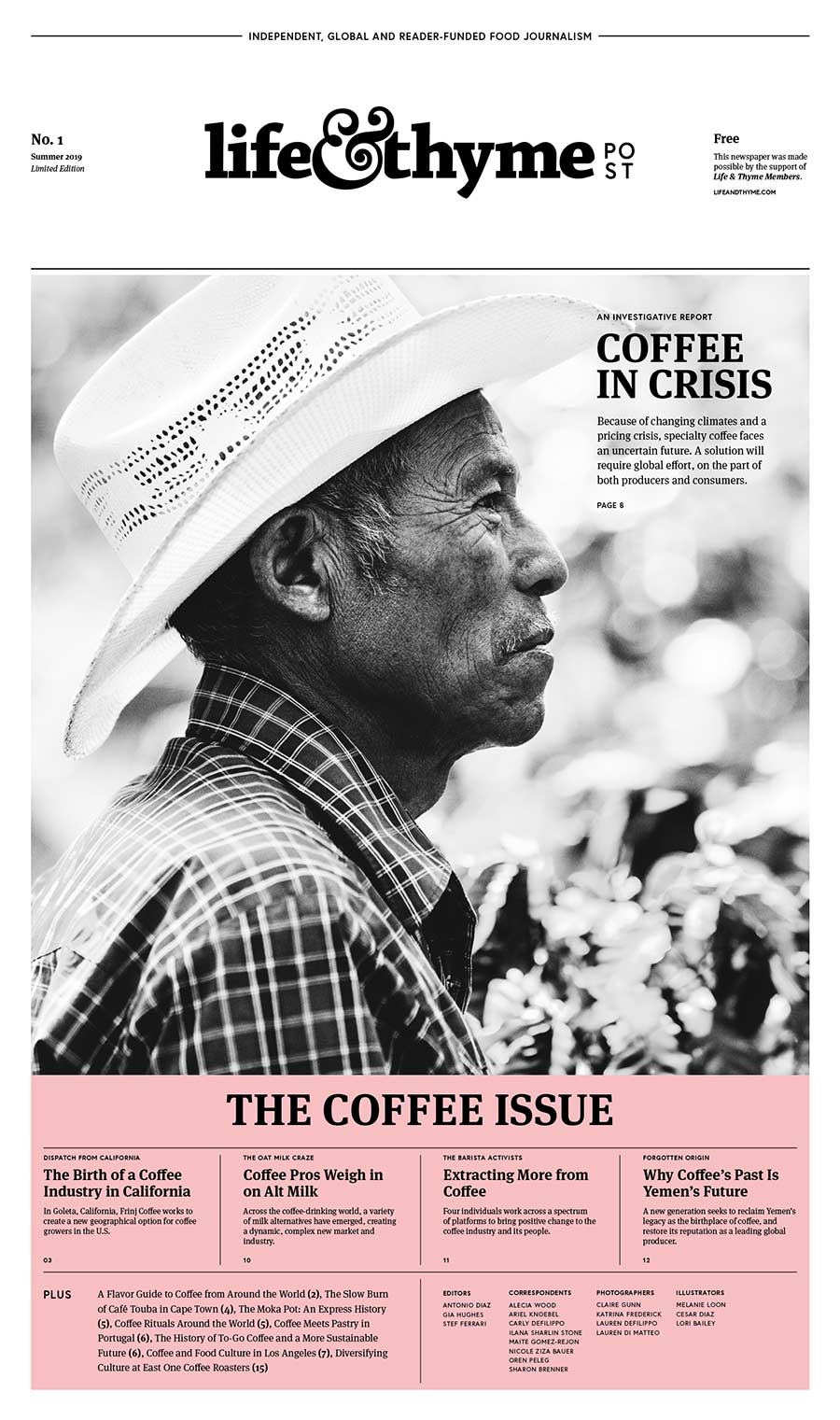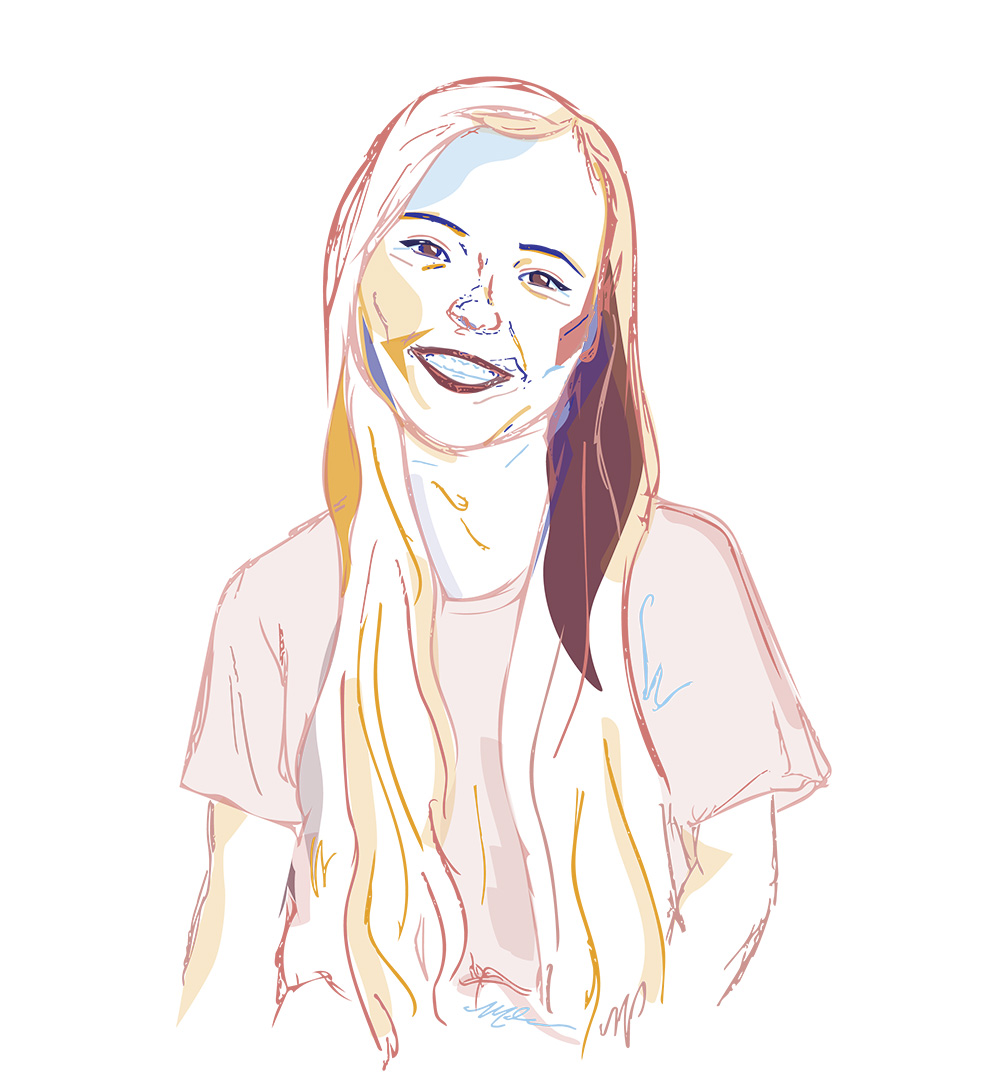August 7, 2019
Beyond the Barista
Four individuals work across a spectrum of platforms to bring positive change to the coffee industry and its people.
Words by Maite Gomez-Rejón
Illustrations by Melanie Loon

This story can also be found in our inaugural issue of Life & Thyme Post, our limited edition printed newspaper for Life & Thyme members.
When coffee made its splash in Europe during the seventeenth century, it was a mysterious and fashionable drink. Introduced to Europe from the Middle East via its native Africa, the warm caffeinated beverage provided a much-needed jolt from the daze Europeans had been under during the Middle Ages. Unlike ale, the beverage of choice at the time, coffee provided clarity of thought and quickly became the preferred new drink among scientists, philosophers, businessmen and politicians.
Coffeehouses that sprung up in cities like London and Paris provided fertile ground for revolutionary thought. Later in New York City and Boston, they continued as places to debate current events, and even shape the future. Thomas Jefferson is even rumored to have drafted the Declaration of Independence in a Parisian coffeehouse.
But as forward-thinking as coffeehouses and the people in them were said to be, women were not allowed entry.
Perhaps the strongest example in the twenty-first century of a woman securing a spot at the coffee counter is Norwegian-born Erna Knusten, who in 1974, founded the “specialty coffee” industry and coined the phrase. But centuries after the Age of Enlightenment, and decades after Knusten’s time, gender inequality remains the norm in the industry.
Today, some of the strongest voices within the specialty coffee industry are not founders or CEOs. They are women and members of the LGBTQ community who are working to make profound changes from within. We had the opportunity to speak with a few of those leading voices. Collectively, Laila Ghambari, Michelle Johnson, Umeko Motoyoshi and Ximena Rubio join countless others in forcing the industry to look inward and confront issues of inclusion, diversity and equity.

Michelle Johnson
SoCal Regional Sales Manager, Coffee Manufactory and “The Chocolate Barista”
Michelle Johnson, who remembers her mother always had a comforting pot at the ready, had her first sip of coffee as a child. Since 2011, Johnson has worked within the specialty coffee industry in the United States and Australia as a competition barista, trainer, writer and educator. Most recently she finds herself in a managerial position at Coffee Manufactory in Los Angeles.
At the beginning of 2016 while working as a barista and community leader in Phoenix, Arizona, Johnson wrote a blog about her experiences as a black woman in the coffee industry. This post explaining “how I navigate through the world and how the world navigates through me” proved to be provocative among the white male-dominated industry. Although her words were championed by many, some advised her to keep politics out of coffee.
By sharing her experience, Johnson put the uncomfortable subject of race front and center, making it impossible to ignore and bringing forth her identity as The Chocolate Barista. From that point on, she says, “diversity and inclusion within the coffee world became a topic of conversation.”
The Chocolate Barista’s platform has grown substantially since that first post almost three years ago. Through lectures and panel discussions across the country, Johnson has been able to connect people of color, from baristas and roasters to salespeople and consumers, and offer resources, advice and a space to “say what they need to say, and tell their truth.”
In addition, she notes a global shift in the industry’s priorities. Now focused on the environmental effects of coffee production, the business has become more conscious of the needs of coffee farmers and their communities in terms of economic and social sustainability. “The coffee industry has a lot of issues they’ve been trying to solve for a long time. How are we going to combat climate change? How are we going to help coffee farmers?” she asks. “How are we going to make this viable for a long time, because currently, coffee has an end date. It’s always been the same people in the room, asking the same questions and coming up with no solutions.”
Johnson says of the shift, “Different people are starting to head initiatives and be the CEOs of their companies. I’m starting to see a lot more women being appointed. A lot more diversity in general is starting to come into these conversations.” She is optimistic that solutions will come from having new people in the room offering unique perspectives and experiences.
As a coffee professional working within specialty coffee today, Johnson is tapped into the industry’s day-to-day operations while continuing to serve as a voice and an advocate, and believes that diversifying the face of the industry is its future.

Laila Ghambari
Director of Education and Training Operations, Stumptown Coffee Roasters
Laila Ghambari has coffee in her blood. As a first generation American and daughter of an Iranian immigrant, Ghambari had the unique experience of growing up in the “very American world” of coffee in the Pacific Northwest. Over twenty years ago, her parents started the Cherry Street Coffee House in Seattle, which now has twelve locations around the city.
Fifteen years ago, Ghambari decided to carry on the tradition of coffee in her own life. Since then, she has written for various coffee publications, and in 2014 went on to win the U.S. Barista Competition. Long a champion of women and the underdog, Ghambari started her career when there weren’t many events for women to connect with one another within the industry. To remedy that, she founded The Coffeewoman and organized events for women to support and inspire each other. And together with her father in 2015, Ghambari helped a group of baristas in Tehran hold their very first internationally recognized barista competition, where she also proudly served as a judge.
Today she finds herself having a conversation she’d never considered as a young barista. “I’m at a point where I still work in coffee but I have a child and I’m pregnant,” she says. Together with friends and coworkers in the industry, she is asking new questions: “What is life as a barista when you’re pregnant? How do you work an eight-hour shift on your feet and also have a baby? Have coffee companies grown enough to know that parental leave is important?”
In addition to fighting for inclusion of women and POC voices in the industry, she now asks the follow-up question: how are they supported—particularly if they choose to have a child—once they’ve been hired? “If we want to see women business owners and women grow into CEOs, then we have to recognize they’re going to need different things,” Ghambari says. She emphasizes these different needs “don’t make women less valuable.” And she also contends that it costs much less to give “someone paid time off versus having to start [the hiring process] from scratch.”

Umeko Motoyoshi
Founder, @wastingcoffee & umeshiso.com
Barista, artist, inventor, writer, activist, advocate for the marginalized, and entrepreneur, Umeko Motoyoshi is a powerhouse in today’s specialty coffee industry. Yet there were times when Motoyoshi felt out of place in it as a mixed race non-binary femme.
Born of a Japanese tea ceremony master, Motoyoshi grew up “attaching a different importance to what it means to serve someone something hot and nice to drink.” Their love of coffee began while working at a tea shop at age eighteen. Motoyoshi then learned to make espresso from an instructional DVD, and from that moment on they tell me, “I never stopped making coffee. And I never stopped drinking it. I’ve been making coffee for my entire adult life.”
“As someone who is bored easily,” Motoyoshi loved the challenge of working in a busy café. “There’s a layer beyond just making coffee. Just learning about how coffee is grown, how the plant is processed, how it’s roasted—learning all the steps within the very complex coffee value chain” proved to be endlessly intriguing. Naturally curious, Motoyoshi mastered the science behind coffee equipment and became an espresso machine technician.
Experience as a technician led to a job at Sudden Coffee in San Francisco where, “I sourced, modeled and designed the equipment” for the company’s specialty instant coffee. “I wouldn’t say there’s a single lens through which I approach coffee. When I moved into designing large-scale commercial coffee grinder equipment, it didn’t make sense for me to approach that from a ceremonial perspective. I was thinking about efficiency. I was thinking about using less water to brew coffee.”
Thinking about efficiency prompted Motoyoshi to start the @wastingcoffee Instagram account in an effort to create a community forum for exchanging tips on reducing waste in the coffee industry. The enthusiastic response led them to write The @wastingcoffee Guide to Not Wasting Coffee reference book in association with Italian coffee machine manufacturer, Faema.
The book is sold on a sliding scale on Motoyoshi’s website, Umeshiso. Alongside books are pins about inclusivity, queerness and mental health, coffee roasted in collaboration with Jen Apodaca (founder of Mother Tongue Coffee and #ShesTheRoaster), and rainbow-colored cupping spoons.
The spoons provide a sense of community to a coffee professional who has felt out of place even after years of being an integral part of the specialty coffee industry. Cupping spoons are used by professionals to taste and evaluate coffee. The term “cupping” refers to the standardized method for evaluating coffee. Popularized by Hills Bros. Coffee in the early 1900s, it describes the process of slurping coffee from a spoon and giving tasting notes. But until the 1980s, women were excluded from the “cupping room.” The space, to this day, remains male dominated, and largely excludes women and the marginalized.
For Motoyoshi, the use of colorful spoons to give cupping notes transmitted a sense of empowerment. Motoyoshi co-spearheaded a sexual harassment lawsuit against Four Barrel Coffee in 2018. “The environment there was so scary and emotionally abusive. I really just internalized it,” they tell me of the experience. “I already had some rainbow cupping spoons.” They began mailing them out for free to friends, as a “way to connect with people. It’s really isolating and really lonely when you’re dealing with something and a lot of times people don’t know how to connect with you or to offer support.”
Always vocal, Motoyoshi called out the inequities in the cupping room through a series of articles titled “Gender and the Cupping Table.” Their writing placed a “problem that hadn’t been talked about or named” front and center. #CupTheRainbow tasting events are now beginning to spring up around the country.
Through science and ceremony, Motoyoshi is making sure everyone has a welcome seat in the cupping room.

Ximena Rubio
Head of Quality Control, Quentin Café
While Ghambari, Johnson and Motoyoshi are fighting for equality within the coffee corporate structure, Mexico City’s Ximena Rubio is fighting to create that structure. Drawn to coffee as a teenager, Rubio’s first job was in a specialty coffee shop. She then decided to devote her career to the warm brew but knew it would be a struggle because of Latin America’s lack of upward mobility in the coffee hierarchy.
Coffee in Mexico has deep ties to colonialism. The plant was introduced in the 1700s by the Spanish and by the mid-1800s was being cultivated on a large scale in plantations mostly in the southern states. Today coffee is one of Mexico’s most lucrative exports, yet until recently the beverage itself has been consumed primarily as a morning pick-me-up or as part of the sobremesa at lunch or dinner (Translating to “over the table,” the sobremesa is the time spent talking around the table after a meal).
Cafés have existed in the country for centuries, yet specialty coffee is a relative newcomer. Rubio explains that although the business model of working up from dishwasher to manager to trainer exists, the concept of being promoted while paying one’s dues is foreign in the Latin American coffee industry. “Many specialty coffee shop owners say they pay their producers a living wage but are taking advantage of their baristas. The average wage for a barista in one out of every three coffee shops is $3,500 to $4,000 pesos per month” (which is the equivalent of $150 to $200 U.S.).
Apart from low wages, baristas are not given health insurance. “It’s an incredibly unjust system,” Rubio states with frustration. Additionally, “the price of coffee in the stock exchange is under the cost of production so we’re living in a moment of great inequity; there are producers that are millionaires and others who don’t know if they’re going to eat.”
Rubio is creating her own path in Mexico and is using her voice to create awareness and fight for justice for all. Through her young career, Rubio has worked as a barista, writer, and up until recently had the first and only Spanish language podcast devoted to coffee. Today she oversees training at Quentin Café in Mexico City and hopes to continue generating “changes from within to make sure the coffee industry is as wonderful as it can be.”
While most specialty coffee shop owners in Mexico have “no empathy, only apathy,” she plans to continue to use her voice to call out injustices until a life in coffee can be a viable career option.
——
Although activism is their common thread, their original passion for serving a warm cup of coffee is what first drew these powerful voices into a life in specialty coffee. Together across the industry, honest voices, bold words, sweet spoons, and warm coffee transcend borders, creating a more egalitarian world one sip at a time.






Our comments section is for members only.
Join today to gain exclusive access.